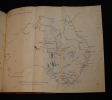Durkheim Emile
Les Formes élémentaires de la vie religieuse : Le système totémique en Australie
Librairie Félix Alcan Travaux de l'année sociologique Relié 1912 EDITION ORIGINALE. In-8 (15 x 22 cm), reliure demi-toile maroquinée, dos lisse, gardes couleur, 647 pages, bien complet de la carte dépliante in fine ; quelques petites marques de frottement au papier reliure aux coins et bords des plats, des rousseurs à l'intérieur, par ailleurs bon état général. Livraison a domicile (La Poste) ou en Mondial Relay sur simple demande.
Reference : ga2453
Bookseller's contact details
Abraxas-Libris
Patricia Pichot
7 et 11 rue du faubourg Bertault
35190 Bécherel
France
33 02 99 66 78 68
Payment mode



Sale conditions
Les livres sont décrits d'une façon précise et claire. Pour toutes questions n'hésitez pas à nous envoyer un courrier. Les frais de port sont à la charge du client. Frais de port, 6 euro pour le colissimo, colieco 4, 20. Les prix sont TTC, les librairies anciennes ne facturant pas de TVA. Abraxas-Libris accepte les paiements par chèque, virement bancaire et par carte bancaire. En cas de désaccord sur une transaction vous aurez trois jours après ouverture du courrier pour déposer une réclamation.
5 book(s) with the same title
Les formes élémentaires de la vie religieuse. Le système totémique en Australie. Troisième édition.
Paris, Librairie Félix Alcan-Bibliothèque de Philosophie Contemporaine, s.d. In-8 broché (manque la page de titre, couverture défraîchie), 647 pp. + 1 carte ethnographique de l'Australie.
Les formes élémentaires de la vie religieuse - le système totémique en Australie - Collection quadrige n°77.
Presses Universitaires de France. 1994. In-12. Broché. Bon état, Couv. convenable, Dos satisfaisant, Intérieur frais. 647 pages.. . . . Classification Dewey : 200-RELIGION
Collection quadrige n°77. Classification Dewey : 200-RELIGION
Les formes élémentaires de la vie religieuse. Le système totémique en Australie. Avec une carte hors texte. - [THE SOCIAL ORIGIN OF RELIGION]
Paris, Félix Alcan, 1912. 8vo. Completely uncut and unopened, in the fragile original printed green wrappers. Remains of a paper label to front wrapper, otherwise an exceptionally fine, clean, and fresh copy. Light minor brownspotting due to the quality of the paper. Housed in a custom-made green cloth box with gilt red laetaher title-label to spine. (4), 647 pp + folded map + publisher's catalogue (38, (2) pp).
Scarce first edition - especially in this condition - of what is generally regarded as Durkheim's magnum opus, his groundbreaking study of totemism among the Australian aborigines, which led him to the foundational conclusion that religion is social, that the primary purpose of religion is to bind people together. Showing that society is the soul of religion, that society is the foundation of all religious belief, and that religion is what allows for a society to express its social unity ""The Elementary forms of religious Life"" furthermore explains the enduring relevance of religion throughout history. In this milestone work of sociology, Durkheim sets out to discover the enduring source of human social identity. To that aim, he investigates totemism among the Australian Aborigines, acknowledging that all religion has its origin in totemism. Totems are collective symbols that represent both a god and society. The collective thought, of which totemism is an early expression, is the basis of all religious thought and as such also of philosophy and modern science.The work came to have a profound effect on not only sociology and religion, but also on philosophy, psychology, and history of science, documenting how collective thought, through totemism and religious expression, enabled mankind to enter into a world of concepts and correspondence and to identity causes and relations. All philosophy and science ultimately rests on this collective thought, which allowed mankind to enter into a conceptual realm. ""The Elementary Forms has been applauded and debated by sociologists, anthropologists, ethnographers, philosophers, and theologians, and continues to speak to new generations about the intriguing origin and nature of religion and society."" (from the English langiuage translation).""The general conclusion of the book which the reader has before him is that religion is something eminently social. Religious representations are collective representations which express collective realities" the rites are a manner of acting which take rise in the midst of assembled groups and which are destined to excite, maintain, or recreate certain mental states in these groups. So if the categories are of religious origin, they ought to participate in this nature common to all religious facts" they should be social affairs and the product of collective thought. At least -- for in the actual condition of our knowledge of these matters, one should be careful to avoid all radical and exclusive statements -- it is allowable to suppose that they are rich in social elements."" (From ""The Elementary forms of religious Life"").
Les formes élémentaires de la vie religieuse. Le système totémique en Australie.
Paris, Félix Alcan, 1925. 8vo. Uncut in the original printed wrappers. Front wrapper detached and top of spine of wrapper missing. Internally fine and clean. 647 pp + map.
Second edition of what is generally regarded as Durkheim's magnum opus, his groundbreaking study of totemism among the Australian aborigines, which led him to the foundational conclusion that religion is social, that the primary purpose of religion is to bind people together. Showing that society is the soul of religion, that society is the foundation of all religious belief, and that religion is what allows for a society to express its social unity ""The Elementary forms of religious Life"" furthermore explains the enduring relevance of religion throughout history.
"Les formes élémentaires de la vie religieuse; le système totémique en Australie. Bibliothèque de philosophie contemporaine."
Paris, Presses Universitaires de France (PUF), 1968. "13 x 21, 647 pp., broché, état moyen (couverture défraîchie; soulignages au crayon)."
5e édition.
 Write to the booksellers
Write to the booksellers




